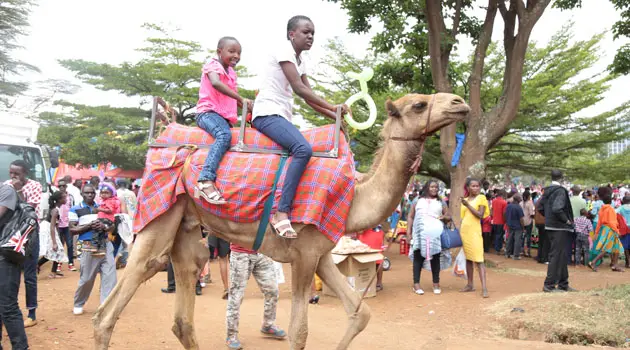Christians celebrate Christmas with enthusiasm all around the world, and Kenya is no exception.
Though the festivities may not be as widespread as in some Western countries, Kenyans, nonetheless, mark the holiday with a vibrant accompaniment of colorful festivities, décor, folklore, and traditional dishes.
If you are in Kenya or planning to visit the country for the Christmas celebrations, chances are your time will be worth it.
Christmas is the most widely celebrated religious festival in the world (ahead of Easter, Ramadan, Chinese New Year, and Diwali) and is considered a cultural aspect for the 2.7 billion Christians worldwide.
Some Christmas customs date back to pre-Christian and secular origins, but common ones include church sermons, exchange of gifts with loved ones, dance, carols, and Christmas dinner.
Christmas holiday in Kenya is a phenomenon. Alongside a host of local traditions, Christmas is a time to get together with loved ones, enjoy customary meals, and revel in the annual festivities.
Wondering how Christmas is celebrated in Kenya? This post outlines what happens during this exciting time of the year.
What Christmas Means to Kenyans
Nothing quite compares to Christmas festivities in Kenya.
Kenya’s population is largely Christian, and that makes Christmas the most important religious event in the calendar year.
For adults, it is the perfect opportunity to wind down, take stock of the year’s progress, bond, and celebrate the holiday with extended family.
In theory, Christmas means more to school-going kids in Kenya because it is when they have the longest holiday season on their school calendar.
That affords them more time to play with peers, visit distant relatives, and make memories to live with forever.
Christmas Preparations in Kenya
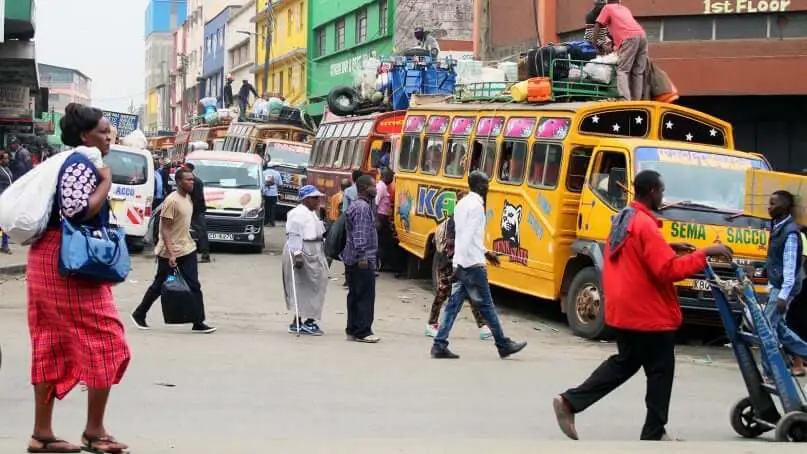
December 25 is a public holiday in Kenya, so public offices, schools, banks, and most businesses close down for the day.
That allows city dwellers and town employees to take a road trip to upcountry villages to reconnect with extended family – a timely break from the noisy, fast-paced hustles and bustles of city life.
During this time, folks flock to public bus stations where PSV owners often double or triple bus fares due to the holiday rhetoric. Traffic jams out of the cities on Christmas Eve are common.
In terms of Christmas preparations, it is not uncommon for Kenyans to prepare for the Christmas holidays (consciously or subconsciously) as early as January.
Most will set goals and create a timeframe to achieve them by Christmas Day.
Some Kenyans use Christmas holidays to evaluate their career path, renew their sense of health, enjoy the exquisiteness of the upcountry’s relatively unexplored nature, and settle on New Year’s resolutions.
That said, Kenyans use two approaches to actively prepare for the Christmas holidays: Some start to prepare a month in advance, while the majority wait until the last minute.
Given the country’s huge income disparities, some don’t even make preparations at all.
At the top of the social strata, financially able folks prefer early preparations.
By contrast, early Christmas preparation is a luxury that those living in poverty can’t afford.
Food and Gifts are Central to Christmas Preparations
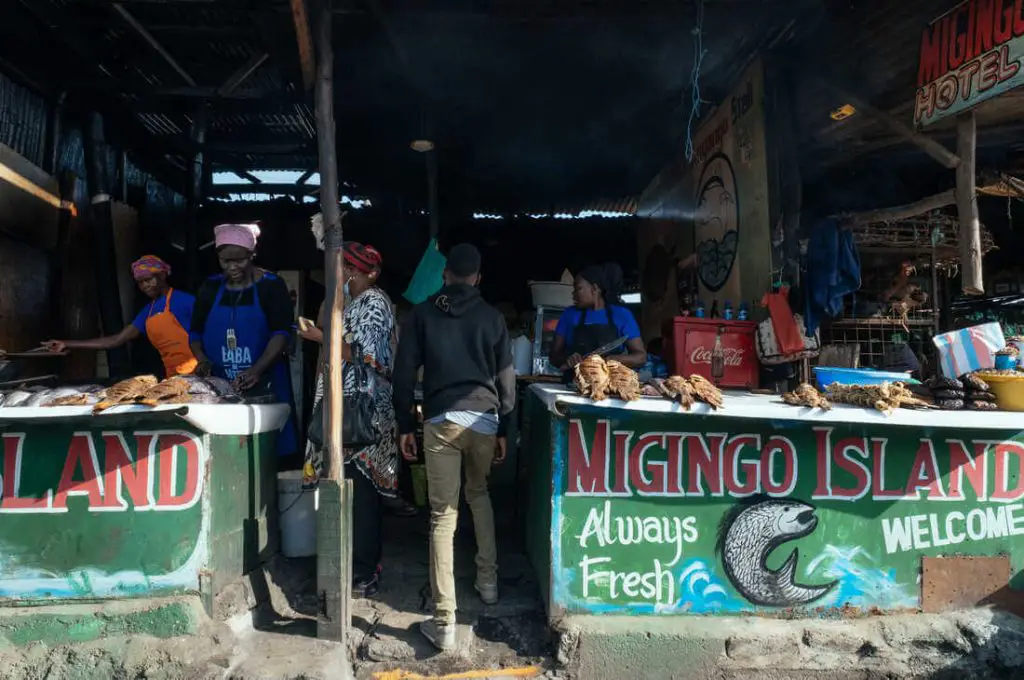
Unlike Europe or North America where Christmas trees kick in the holiday spirit, Kenyans signify the season with food and gift purchases.
However, some city families, malls, and businesses have, in recent years, embraced the idea of setting up Christmas trees in their homes, walkways, driveways, or shopfronts.
Traditionally, Kenyans buy animals like cows, goats, or children, as well as foodstuffs such as wheat flour and rice.
All these are essential to prepare traditional Christmas Day delicacies like nyama choma (grilled meat) and chapati (flatbread).
In the cities, parents swarm malls and large shopping centers to purchase new clothes, shoes and presents for their kids and loved ones.
Common presents include toys, bicycles, school bags, electronics, or even trips to popular tourist destinations in the country, including Masai Mara, Hell’s Gate, and Mount Kenya.
Parents also reward their children with gifts they promised to offer during the year.
If your parent had promised to buy you something if you excelled in school, then Christmas time is the perfect opportunity to fetch it.
Christmas Eve in Kenya
In Kenya, Christmas celebrations typically begin on Christmas Eve.
Christmas Eve, being the penultimate day, is filled with excitement and anticipation.
Most people do not sleep on the night of December 24.
Churches typically adorn their interiors with Christmas décor, along with balloons and brightly colored lights and banners. Music and singalongs are the themes of the evening.
On Christmas Eve, Christians attend midnight church services. Here, hymns, carols, dances, poems, and songs praising or alluding to the life of Jesus Christ dominate the service.
Some churches incorporate nativity plays (where children take on the roles of the Shepherds, Mary, and Joseph) into their midnight service to illustrate the Christmas story and usher in the reason for the season.
After the service, people get back to their homes, and that is when the real party gets underway.
Most Kenyans, despite staying up all night celebrating Christmas Eve, attend a short early church service on the morning of December 25.
How Kenyans Decorate for Christmas
As mentioned earlier, setting up Christmas trees isn’t a tradition in Kenya.
However, more city dwellers are embracing this idea. Pine or fir trees aren’t native to Kenya, so those who choose to set up a tree use cypress.
In most urban churches, walkways, and homes, Kenyans use Christmas decorations like multi-colored balloons, ribbons, flowers, green leaves, and homemade paper decorations.
Large shopping centers such as hypermarkets decorate their entrances and interiors using large outdoor light displays, electric string lights, and acrylic balls.
In rural setups, decorations can be few and far between. However, most Kenyans plant colorful flowers in their front yards with the expectation they will bloom just in time for the season.
Others will trim their hedges, cut grass, repaint houses, or decorate house interiors with balloons and confetti.
Traditional Christmas Dishes in Kenya
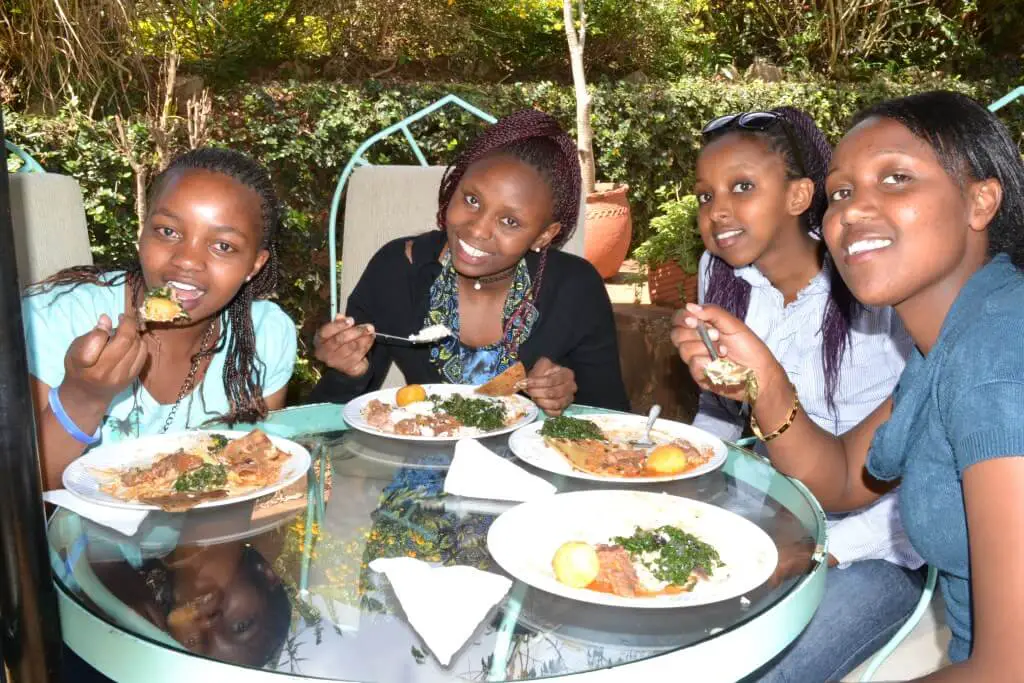
Kenya is home to 42 tribes with diverse cultures, but the commonality with every family is the food served during Christmas.
Beef, chicken, goat meat, or sheep make up the main course and are the most popular traditional Christmas dishes in Kenya.
Many families slaughter their livestock to prepare nyama choma (grilled meat), but rice, chapati, or ugali (the country’s staple food) are commonly served as side dishes.
Both rural and urban families serve Christmas’s main meal after church on the afternoon of December 25.
Some tribes also mark the occasion by preparing special dishes native to them.
The feast for city dwellers largely draws inspiration from the Western world and can conclude with cake, candy, or pudding as dessert.
For rural folks, dessert is mostly out of the equation because it is a luxury many can’t afford.
Those who celebrate Christmas upcountry get to be lucky because some families brew their traditional beer on this special occasion.
If you are in the city, however, the common theme is to gather with friends or family in a joint or restaurant to enjoy a drink.
What Does Christmas Day Look Like For Most Families In Kenya?
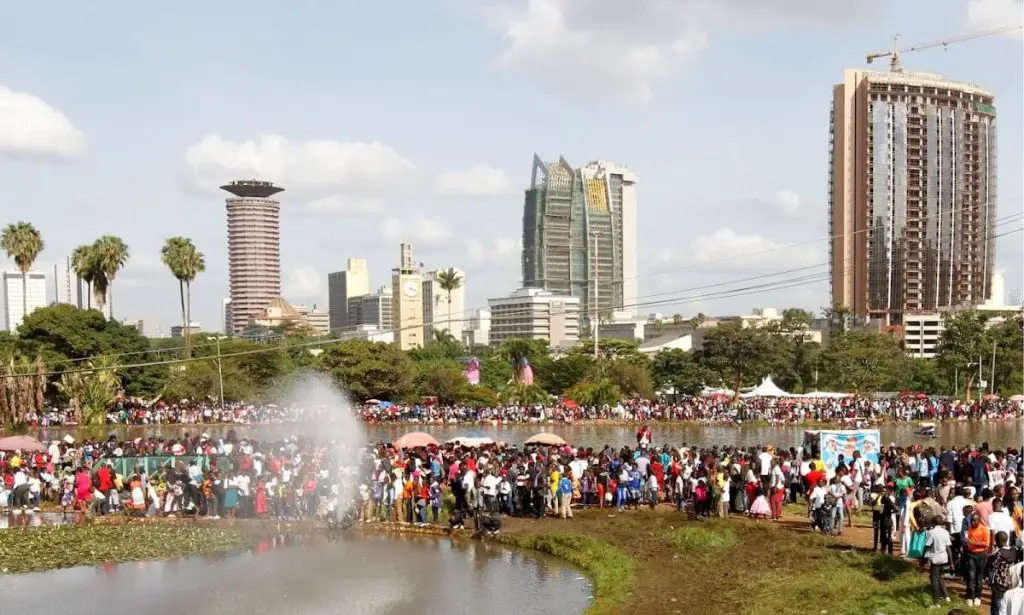
If you still have any energy left partying or staying up the previous night, then the sky is still the limit on Christmas Day.
Come the morning of December 25, most families would take tea, chapati, and any other light dishes before heading for a short church service.
Unlike other church services, this one is kept short so families can have the rest of the day to celebrate.
The main activities at the Church (and after) will include:
I. Caroling
Practicing Christmas carols start way before Christmas Day.
A week or so beforehand, Sunday school children gather at their respective churches to rehearse for poems, skits, or carols to be presented on Christmas Day.
Caroling is a tradition and will typically involve performances by kids.
In the spirit of Christmas giving, churchgoers often award gifts to children after their performances.
II. Gift Exchanges
Traditionally, Kenyans exchange Christmas gifts after church.
However, most would do that at the earliest opportunity, including on Christmas Eve or early morning on Christmas Day.
III. Photo Sessions
In Kenya, most people work in the cities and would mostly meet with extended family over the Christmas holidays.
So, the urge to keep a photo memory on this rare occasion is understandable.
Friends and family often participate in photo sessions, usually at makeshift photo studios on the streets or in the church compound.
IV. Food and Drinks
This is perhaps the most important aspect of Christmas festivities.
After church, loved ones gather in their respective homes to feast on popular Christmas dishes prepared beforehand.
Many families will spend the rest of the afternoon playing games or enjoying each other’s company.
V. Outdoor Fanfare
If you are feeling untamed, you will be glad to know that many outdoor events and tournaments are organized on Christmas Day in Kenya.
Folks, especially in the countryside, perform traditional dance and music that feature colorful costumes and ornate decorations.
Besides, most sub-counties will organize sizeable outdoor activities where attendees can enjoy street acts, football, live entertainment, and plenty of mouthwatering fanfare.
Cultural Activities During Christmas in Kenya
Kenya is rich in diversity, and that is especially highlighted during Christmas festivities.
Communities come together to perform traditional dance and music, make and share traditional foods, give and receive gifts, or decorate homes and public places to light up the festive atmosphere.
Conclusion
Except for traditional dishes, cultural activities, and all the festivities that are unique to Kenya, the rest of the country’s Christmas celebrations are largely borrowed from the Western world.
For many Kenyans, Christmas is a time when friends and family join together to enjoy food, presents, and customs.
Like its global significance to Christians, Christmas is a vital part of Kenya’s cultural legacy that allows adults and kids to celebrate traditions and create lasting memories.

